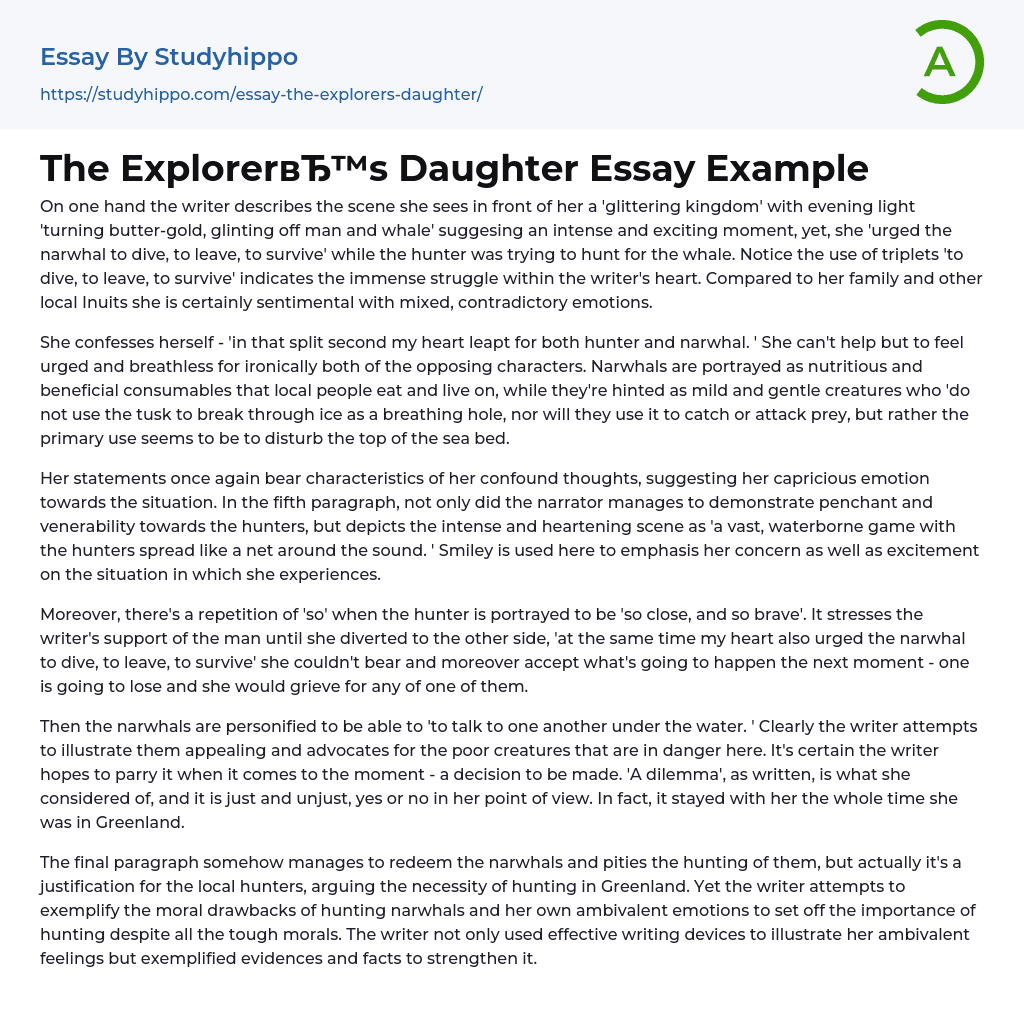
On one hand the writer describes the scene she sees in front of her a 'glittering kingdom' with evening light 'turning butter-gold, glinting off man and whale' suggesing an intense and exciting moment, yet, she 'urged the narwhal to dive, to leave, to survive' while the hunter was trying to hunt for the whale. Notice the use of triplets 'to dive, to leave, to survive' indicates the immense struggle within the writer's heart. Compared to her family and other local Inuits she is certainly sentimental with mixed, contradictory emotions.
She confesses herself - 'in that split second my heart leapt for both hunter and narwhal. ' She can't help but to feel urged and breathless for ironically both of the opposing characters. Narwhals are portrayed as nutritious and beneficial consumables that local people eat and live
...on, while they're hinted as mild and gentle creatures who 'do not use the tusk to break through ice as a breathing hole, nor will they use it to catch or attack prey, but rather the primary use seems to be to disturb the top of the sea bed.
Her statements once again bear characteristics of her confound thoughts, suggesting her capricious emotion towards the situation. In the fifth paragraph, not only did the narrator manages to demonstrate penchant and venerability towards the hunters, but depicts the intense and heartening scene as 'a vast, waterborne game with the hunters spread like a net around the sound. ' Smiley is used here to emphasis her concern as well as excitement on the situation in which she experiences.
Moreover, there's a repetition of 'so' when the hunter is portrayed to be 'so close, and
so brave'. It stresses the writer's support of the man until she diverted to the other side, 'at the same time my heart also urged the narwhal to dive, to leave, to survive' she couldn't bear and moreover accept what's going to happen the next moment - one is going to lose and she would grieve for any of one of them.
Then the narwhals are personified to be able to 'to talk to one another under the water. ' Clearly the writer attempts to illustrate them appealing and advocates for the poor creatures that are in danger here. It's certain the writer hopes to parry it when it comes to the moment - a decision to be made. 'A dilemma', as written, is what she considered of, and it is just and unjust, yes or no in her point of view. In fact, it stayed with her the whole time she was in Greenland.
The final paragraph somehow manages to redeem the narwhals and pities the hunting of them, but actually it's a justification for the local hunters, arguing the necessity of hunting in Greenland. Yet the writer attempts to exemplify the moral drawbacks of hunting narwhals and her own ambivalent emotions to set off the importance of hunting despite all the tough morals. The writer not only used effective writing devices to illustrate her ambivalent feelings but exemplified evidences and facts to strengthen it.
- Pressure essays
- Confidence essays
- Disgrace essays
- Lost essays
- Harmony essays
- Fairness essays
- Sarcasm essays
- Respect essays
- Responsibility essays
- Empathy essays
- Suffering essays
- Suspense essays
- Fear essays
- Feeling essays
- Loneliness essays
- Ambition essays
- Tolerance essays
- Hope essays
- Inspiration essays
- Kindness essays
- Shame essays
- Desire essays
- Doubt essays
- Grief essays
- Hate essays
- Laughter essays
- Passion essays
- Pride essays
- Forgiveness essays
- Happiness essays
- Humanity essays
- Loyalty essays
- Guilt essays
- Honesty essays
- Betrayal essays
- Need essays
- Boredom essays
- Courage essays
- Regret essays
- Anger essays
- Honor essays
- Honesty Is The Best Policy essays
- Christina Rossetti essays
- Emily Dickinson essays
- Ernest Hemingway essays
- Percy Bysshe Shelley essays
- Robert Browning essays
- Robert Louis Stevenson essays
- Seamus Heaney essays
- Carol ann duffy essays



